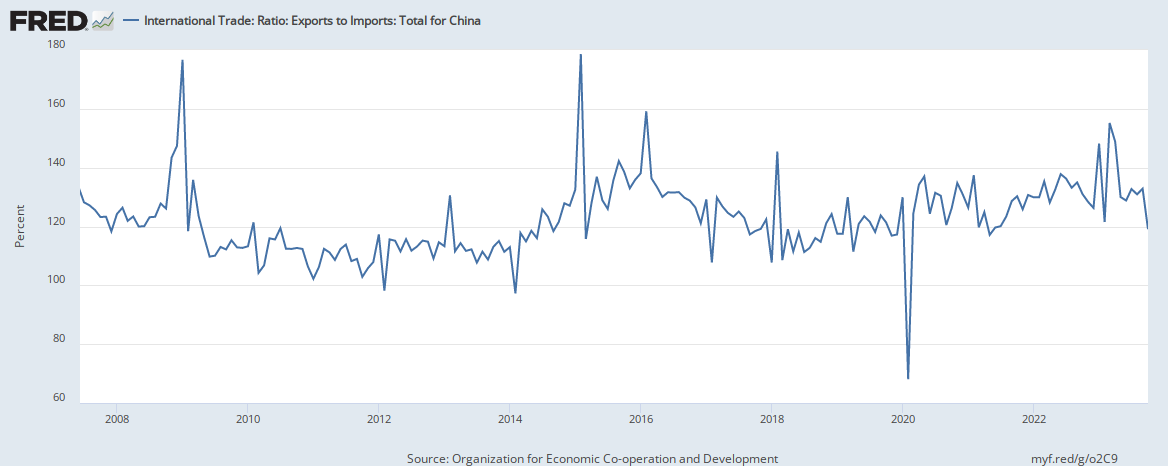Fact Checking
Well-Known Member
And you can't print enough CNY to properly fix this without crashing the currency.
That's wrong.
Until the trade balance is wildly positive, the exchange rate of the "real" CNY is set by its trading flows, and the exchange rate to the internal currency is basically domestic policy: to control imports. By weakening/strengthening the CNY China can decrease/increase imports and domestic consumption.
China has various layers of capital controls to isolate internal demand.
And China's trade balance is wildly positive and growing:

Exports never dipped below imports in the last 10 years, and the export surplus averages around 15-20% of the economy... (And in case you distrust Chinese economical data, which I agree that you generally should: this is a U.S. Federal Reserve data series, and imports/exports balance to a country can be measured independently by their main trading partners and is thus much harder for the country to fudge.)
And note that exports to imports ratio has been increasing since the trade war. (What Trump didn't realize is that by starting a trade war with China the U.S. is hurting their own consumers and corporations mainly.)
But the most important takeaway: China could literally burn up 15-20% of the ~2,100 billion dollars and Euros they are earning to heat the Forbidden City, and still be OK and stable macroeconomically.
The bad debt does not "literally disappear" when it reaches state controlled banks (that's basically all of them by the way) but bounces around the multiple balance sheets of each or gets wrapped up as a trust product and moved onto another unsuspecting participant in the domestic economy. It's still there strangling the long term growth potential of the economy.
It literally disappears as it's written off over years/decades and becomes irrelevant by the inflation rate and growth of the economy. In an economy that is growing ~7% year over year on ~2% of inflation, 1 billion dollars of debt in 2000 has been reduced to only $194m of debt today in 2000 dollars. (!)
The "Chinese ghost towns" cited as examples of bad central planning and bad investments back in the 2000s? One of the big "ghost towns" was Lingang New City:
The town is now called "Nanhui New City", a city now hosting several large colleges, and you might have have heard of it here as well, because Tesla is building a Gigafactory right there.
And the debt caused by the construction costs of this new city might still be somewhere on the balance sheets of a Chinese state owned bank or a Chinese local government.
There's no shareholders of state owned banks to be worried about the balance sheet, other than top officials of the Chinese Communist Party. There's no solvency worries of Chinese state owned banks, ever, as the Central Bank of China is controlled by the same Chinese Communist Party.
But the most important part: debt can only damage an economy if it has a "channel of effect", such as:
- reducing solvency of the corporation owing it and thus increasing its financing costs,
- or by forcing it into "austerity" that damages its future growth prospects,
- or by draining its cash income via interest payments,
- or by making it harder to raise new funds.
Again, I understand and realize that this is highly non-intuitive from the viewpoint of western economies, democracies and monetary systems. Alternatively, instead of accepting my line of arguments, you could attempt to falsify my claim: in what way does "bad debt" on the balance sheet of Chinese state owned banks have a negative effect on the real economy? Just outline a single such channel of effect. I believe you won't be able to.
Last edited:


